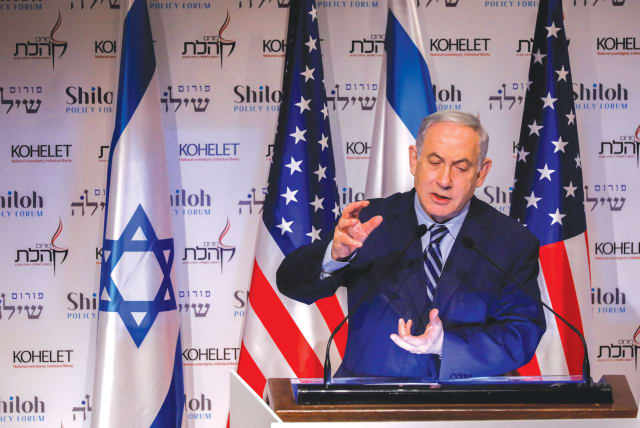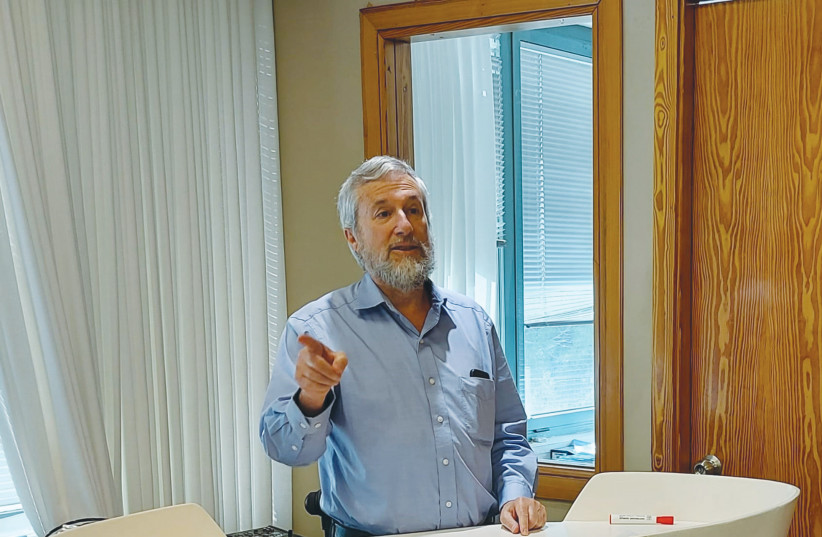Can this Israeli think tank push a judicial reform compromise? - opinion

I hope your true legacy becomes that Moshe Koppel triggered some judicial reforms and helped save Israel.
Dear Prof. Koppel,
True, these days, progressives don’t believe in progress and conservatives don’t conserve institutions but this is ridiculous. Why import America’s insanity? Israel’s coalition conservatives should remember to cultivate lasting change by curating consensus not crushing fellow citizens. And protesting progressives should understand that saving democracy by claiming it’s dying, damages democracy.
I appeal to you, American oleh to American oleh. Since founding Kohelet Policy Forum, you helped place judicial reform on Israel’s agenda. I’m appalled that Haaretz, J Street and others fume about “the Kohelet tentacles” and “the web” of billionaires funding you. Shame on them, when right-wingers use similar language blasting George Soros. The New York Times calls it “barely coded antisemitism,” as the ADL identifies the “antisemitic roots” in “tropes” like tentacles and web.
I read your charming deflection that “as much as my parents would like to believe that I secretly run the country, politicians sometimes politely hear me out” but ultimately, they decide.
Still, our leaders need help and they seem to listen to you. Yariv Levin and Simcha Rothman are playing that oh-so-transparent game of quoting the most radical attacks to justify pushing through Hareforma (The Reform). Their categorical refusal to compromise suggests they’re more committed to drive-by-shooting identity politics than good governance. And our prime minister, after silently letting stress levels soar, compared the striking protesters’ “lies” to hitting “against terror.”

Shame on him, especially this week.
Can the Kohelet Policy Forum influence Israeli judicial reform, compromise?
Years ago, while researching think tanks’ impact on Ronald Reagan’s presidency, I asked Hirsch Goodman if any intellectuals ever shaped Israeli policy during his long journalism career. “Ideas don’t drive politics here,” he sighed. “It’s Chicago.”
You and Kohelet have proved that ideas can drive Israeli politics, but it’s still Chicago. And politics isn’t a math equation: when you change one variable, such as judicial power, other variables invariably vary, too.
Your thought-provoking proposals, weaponized by brutal, unyielding, Chicago-esque power politicians, have frazzled Israel. More interested in humiliating their opponents, these bullies threaten just what your fascinating book Judaism Straight Up rightly says healthy societies need: trust and cooperation.
I frankly don’t care about the crybabies threatening to leave the country; I do care about the patriots crying about our country.
You recently wrote in the Times of Israel: “If opponents of the reform would negotiate on its merits... perfectly reasonable arrangements supported by a broad consensus are within easy reach. Any takers?” There are: Israel’s Silenced Majority. They support President Isaac Herzog and are desperately seeking a compromise. To get to “yes,” stop quoting the catastrophizers and start brainstorming.
These nerve-wracking months have highlighted Prime Minister Benjamin Netanyahu’s greatest achievement until now. Netanyahu helped Israel achieve a stability no one imagined in the 1970s when jokesters wondered who would turn out the airport lights after everyone fled. With Netanyahu now destroying that hard-earned calm by fueling tribal revenge fantasies and seeking to crush his rivals, you and your colleagues become essential.
Zionist-to-Zionist, I sense a kindred spirit. I respect your vision of a proud, strong, democratic Jewish state, maximizing our liberty, dignity, prosperity and solidity. And American-to-American, I know you know how much Americans understand democracy’s need for robust checks and balances.
IN FOURTH GRADE, we mastered Baron Montesquieu’s rock-paper-scissors-match game, American-style, with the executive, bicameral legislature and judiciary checking and balancing each other. We absorbed a greater lesson too: Fragmenting power prevents dictatorship; concentrating power encourages it.
In America, power is distributed through 500,000 elected officials and 18.28 million bureaucrats in 50 states, 3,000 counties, 13,500 school districts and 19,000 townships.
Israel’s opposition legitimately fears that neutering the court will boost an ever-more-powerful prime minister. All parties should share this fear. Diffusing power frustrates the powerful occasionally but protects every citizen always.
That genuine concern offers a way forward. The dominant party should lead, breaking the impasse by graciously making some concessions. Ignore the extremists while addressing us, the peace-seeking moderate majority. Pass some reforms eventually but lower your proposed number of judges needed to invalidate laws while raising the Knesset votes needed to override judicial decisions.
Mutual haggling will shrink the protests, leaving the extremists shouting alone and nurturing consensus guarantees that some reforms will survive when the Center-Left rises again.
Then, start fragmenting power. You have wisely proposed that no single Knesset should pass a Basic Law but defer a final reading to a subsequent Knesset. Let’s also elect some Knesset members regionally, weakening every party’s stranglehold on its members. And to calm Israel immediately, how about freezing major reforms for six months, as a blue-ribbon commission assesses these and other ideas?
Negotiating, adjusting and slowing down this breakneck process, while creating long-needed counterweights to Israel’s super-powered prime minister would end the sky-is-falling hysteria. It would represent a more significant change than the cottage cheese protesters secured in 2011 with the Trachtenberg Commission. The calming concession would parallel the 1982 Sabra-Shatila protests that ended with a Kahan Commission and defense minister Ariel Sharon’s eventual resignation.
Imagine producing a more proportionately-powered court with a better power balance, topped by a symbolic grand slam. Let’s show the world that our yelling and screaming didn’t break us but propelled us forward.
Most naively expect democracies to leap forward, gazelle-like, toward new heights. More often, democracies stumble drunkenly ahead, with occasional barroom brawls. Grownups must referee those fights. President Herzog is playing that role and you can help.
Right now, too many people think you triggered the judicial reform, yet scarred Israel. I hope your true legacy becomes that Moshe Koppel triggered some judicial reforms and helped save Israel.
In friendship,
Gil Troy
The writer is a distinguished scholar of North American history at McGill University and the author of nine books on American history and four books on Zionism. He is the editor of the new three-volume set, Theodor Herzl: Zionist Writings, the inaugural publication of The Library of the Jewish People (www.theljp.org).
